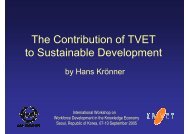Learning for Life, Work and the Future Initial ... - Unesco-Unevoc
Learning for Life, Work and the Future Initial ... - Unesco-Unevoc
Learning for Life, Work and the Future Initial ... - Unesco-Unevoc
Create successful ePaper yourself
Turn your PDF publications into a flip-book with our unique Google optimized e-Paper software.
<strong>Learning</strong> <strong>for</strong> <strong>Life</strong>, <strong>Work</strong> <strong>and</strong> <strong>the</strong> <strong>Future</strong> Participants’ Papers Page 87<br />
is not only a response to government policy but also to<br />
dem<strong>and</strong>s from employers. In industry <strong>and</strong> commerce<br />
employers prefer workers with broad (multi-) skills<br />
who can carry out a range of functions in a production<br />
process <strong>and</strong> are adaptable to changing work<br />
circumstances under <strong>the</strong> influence of modern<br />
technology.<br />
3. What are Key Skills?<br />
Key skills are referred to in various ways: key competencies,<br />
generic skills, soft skills, core skills, basic<br />
skills, fundamental skills, transferable skills, capability,<br />
study skills, abilities, attributes, <strong>and</strong> so on. The<br />
question here is: do all indeed refer to <strong>the</strong> same<br />
concept?<br />
A wide range of abilities <strong>and</strong> attitudes has been listed<br />
as key skills, including accountability, flexibility, goal<br />
setting, integrity, self-motivation, punctuality, work<br />
habits, responsibility, leadership, ability to work in<br />
teams, language skills, positive self-image, <strong>and</strong> a<br />
positive attitude towards work. Clearly some personal<br />
skills are more fundamental than o<strong>the</strong>rs to support<br />
human productivity in all vocational areas.<br />
Several authors have tried to place <strong>the</strong> various identified<br />
skills in ‘key areas’. The number of transferable<br />
skills identified ranges from 20 to 108 (Holmes, 1998),<br />
with various categorisations proposed. McLaughin<br />
(1992) placed skills seen as imperative <strong>for</strong> employment<br />
in <strong>the</strong> following categories:<br />
• Communication (underst<strong>and</strong>ing, speaking, listening,<br />
reading, comprehending, using/producing written<br />
materials);<br />
• Thinking (creative, innovative, critical <strong>and</strong> logical<br />
problem solving, effective use of in<strong>for</strong>mation<br />
systems <strong>and</strong> tools, decision making);<br />
• Personal <strong>and</strong> interpersonal (positive attitudes <strong>and</strong><br />
behaviour, responsibility, adaptability, work with<br />
o<strong>the</strong>rs).<br />
4. Is <strong>the</strong> Key-Skills ‘Picture’ Complete?<br />
What is considered to be a key skill will depend on <strong>the</strong><br />
specific group of persons identifying <strong>the</strong> skills.<br />
Employers might ‘see’ different key skills from an<br />
educationalist or rank differently <strong>the</strong> importance of<br />
listed key skills. Key competencies relating to <strong>the</strong><br />
following ‘missing areas’ have been identified:<br />
• (Multi-) cultural underst<strong>and</strong>ing<br />
• Psycho-motor skills<br />
• Musical or visual/spatial skills (arts).<br />
Skills evident in, <strong>for</strong> example, proficient reading,<br />
comprehension <strong>and</strong> appreciation of literature, ethical<br />
concern, generosity, altruism – are <strong>the</strong>y covered?<br />
5. Generic (Transferable) Skills<br />
or Domain-Specific Skills?<br />
Critics of <strong>the</strong> generic skill concept argue that knowledge<br />
<strong>and</strong> skills are context-specific <strong>and</strong> cannot be<br />
isolated from <strong>the</strong> context in which <strong>the</strong>y are embedded<br />
(Breier, 1998). These critics state that <strong>the</strong> so-called<br />
core key or transferable skills are very specific skills<br />
(not context-free at all) that have been identified by a<br />
particular group of employers. They concluded that<br />
conceptions of generic skills are about attributes<br />
required by employers <strong>for</strong> work <strong>and</strong> that transfer of<br />
skills between contexts is a skill in itself. The pursuit<br />
of general transferable core/key skills is termed as<br />
wasteful ghost-hunting. The transferring skill is a<br />
meta-skill that allows selection, adaptation, adjustment<br />
<strong>and</strong> use of <strong>the</strong> o<strong>the</strong>r skills in different situations.<br />
Breier concludes:<br />
<strong>the</strong>re is nothing intrinsically generic or transferable<br />
about <strong>the</strong> skills commonly labelled as generic or<br />
transferable. Most have to be acquired <strong>and</strong> exercised<br />
in specific contexts, with reference to specific<br />
knowledge bases. The term ‘generic skills’ really<br />
refers to competencies that are valued by <strong>the</strong><br />
employers.” (Breier, 1998, p 90 – 91)<br />
6. Fur<strong>the</strong>r Clarification: What Are Key Skills?<br />
What are key skills? How can you distinguish between<br />
a key <strong>and</strong> a non-key competency? Is <strong>the</strong> ‘common’ list<br />
of key competencies sufficiently comprehensive or are<br />
‘key areas’ in human life left out? What do we mean<br />
by ‘transfer’? How like/unlike do two situations have<br />
to be to speak of transfer or to speak of a new skill?<br />
From <strong>the</strong> point of view of <strong>the</strong> generic concept critics,<br />
are key skills transferable or domain specific? Do <strong>the</strong>y<br />
exist at all or is this just a <strong>the</strong>oretical construct?<br />
(Holmes, 1998.)<br />
These are some of <strong>the</strong> fundamental questions in <strong>the</strong><br />
debate over <strong>the</strong> introduction of ‘key skills’ in new<br />
programmes in <strong>the</strong> region. It is worth listening to <strong>the</strong><br />
pros <strong>and</strong> cons raised in countries like <strong>the</strong> UK <strong>and</strong><br />
Australia that already have a respectable experience in<br />
‘key skills’ in <strong>the</strong> curriculum, with strong supporters<br />
<strong>and</strong> detractors. O<strong>the</strong>r countries, notably <strong>the</strong> Nordic<br />
countries, <strong>the</strong> Ne<strong>the</strong>rl<strong>and</strong>s <strong>and</strong> Germany, are exploring<br />
different options such as <strong>the</strong> ‘key problem’ approach.<br />
7. How Were ‘Key Skill’ Areas Identified?<br />
The identification of ‘key skills’ has been based on<br />
analysis of employers’ preferred skills. These initiallyidentified<br />
key skill areas were later revalidated by<br />
employers. How valid is such a validation? Holmes<br />
(1998) states that a faulty methodology <strong>for</strong> <strong>the</strong> identification<br />
of key skills has been used <strong>and</strong> that <strong>the</strong><br />
concept ‘key skill’ itself is flawed.<br />
This raises a number of fundamental questions. Have<br />
key skills or employability skills been identified? Are





